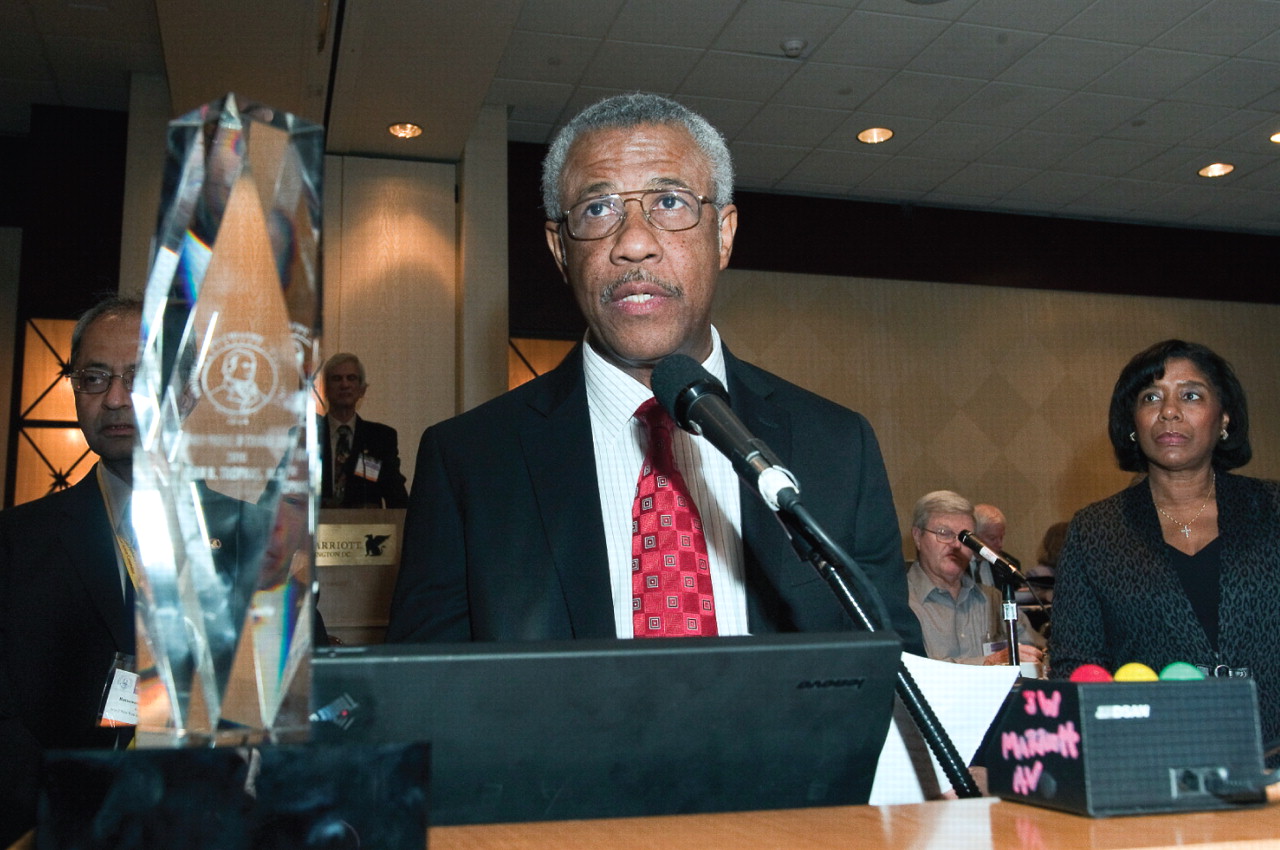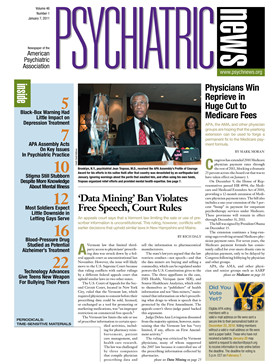Jean Tropnas, M.D., left his native Haiti to practice medicine in the United States several decades ago, but his Haitian roots remain deeply embedded. Soon after a catastrophic earthquake devastated that poverty-stricken nation last January 12, killing more than a quarter million people, including his sister, Tropnas returned to his native land to organize relief efforts and lend his medical and mental health expertise to a population in dire need of both.
His efforts, funded in large part with his own money, earned him the APA Assembly's Profile of Courage Award, which was presented to him at the Assembly's meeting in Washington, D.C., last November.
In presenting the award, Ramaswamy Viswanathan, M.D., D.Sc., Tropnas' colleague in the Department of Psychiatry at SUNY Downstate Medical Center in Brooklyn, N.Y., noted that Tropnas traveled to postearthquake Haiti despite warnings about the dangers that he would face there, including crumbling buildings, rampant crime, and the threat of infections. In Haiti, he ran support groups for medical clinic staff and for elementary school teachers.
In addition to his work in Haiti, Tropnas also reached out to provide what assistance he could to Brooklyn's large community of Haitian immigrants, many of whom lost relatives and friends in the quake.
In accepting the honor, Tropnas said he was “humbled” and wondered if he was really worthy of it. The truly courageous people, he emphasized, are “all of the volunteers who put the desire to help ahead of their personal safety” and the traumatized, severely depressed Haitians who manage to survive despite a continuing series of disasters and setbacks.
Assembly representatives also voted on a number of action papers on issues important to psychiatric practice in the next few years. Among these, the Assembly voted to
•
urge the APA Committee on Electronic Health Records to “fast track” development of guidelines, templates, and evaluations that can help members determine which electronic health records (EHR) system is the best match for their practices. This is urgent, supporters noted, because the government is committed to paying financial incentives to early EHR adopters and penalizing physicians who don't implement such a system by 2014. Without this guidance, one representative noted, members may have to rely on information from the private companies that manufacture these records systems.
•
ask the Board to create a task force to conduct an in-depth examination of criteria used to determine how psychiatrists “and other medical cognitive specialties” are reimbursed for their services. Maintaining that the cognitive work psychiatrists do is “undervalued” by Medicare policymakers and private insurers, who in reimbursement decisions favor procedures over cognitive services, advocates for this proposal said that the goal of the initiative is to propose strategies “recognizing the value of psychiatry and other cognitive medical specialties” that result in increased reimbursement.
•
propose formation of a joint task force of APA and the American Board of Psychiatry and Neurology (ABPN) that would explore various maintenance-of-certification issues other than cognitive evaluation. This task force's charge would be to “explore the best methodologies to improve quality in a variety of psychiatric practice types and settings and explore the ethical issues involved in [including] patient feedback” as one element of the ABPN's maintenance-of-certification criteria. “This type of initiative is just what APA should be doing to assist members,” said APA President Carol Bernstein, M.D. The future of this proposal, of course, depends on an ABPN decision about participation in the joint task force.
Assembly members defeated another paper related to maintenance of certification that would have put APA on record opposing the ABPN mandate that psychiatrists solicit patient feedback as a requirement for maintaining certification. The majority agreed that registering opposition to an issue that the group had just proposed to study would negate the value of the joint task force.
•
have APA develop a primer that would help members who are employed by and receive malpratice insurance through hospitals or other health care entities if their employer declares bankruptcy or closes, and the malpractice coverage ends at that point. This primer would advise such physicians of their coverage risks if they do not have a separate malpractice policy. The proposal also calls on APA to bring this issue to the AMA's attention, since the problem can affect a broad range of physicians.
•
call on APA to establish links on its Web site to its allied psychiatric organizations and urge the allied organizations to link to APA on their Web sites.
•
reject an action paper to rescind APA's invitation to Bishop Desmond Tutu of South Africa to be the Convocation speaker at the 2011 annual meeting in Honolulu in May.
Some Assembly members expressed outrage over statements Tutu has made in speeches and interviews that are critical of Israel and, according to the action paper, “defamatory, distorted, inflammatory, and one-sided.” Some members also labeled Tutu's statements as anti-Semitic. He has compared Israel's treatment of its Arab citizens to the pernicious Apartheid policy that brutally discriminated against South Africa's black citizens. Tutu has also been in the vanguard of a move to urge people and organizations to boycott Israel, calling, for example, for the Cape Town Opera to cancel a visit to Israel, just as many arts organizations wouldn't perform in South Africa during its Apartheid era.
Assembly members opposed to rescinding the invitation said, however, that the choice of a Convocation speaker has long been a prerogative of the APA president, and it would set a bad precedent to begin putting that decision to an Assembly vote because some members may object to stated views of the invitee. Many other Convocation speakers have voiced opinions with which APA members had considerable disagreement, and their presentations provided opportunities for greater dialogue and understanding.
Some cited the negative publicity that APA would face once word got out in the media that it was disinviting a renowned cleric who fought against injustice in his homeland for decades.
Several speakers noted that Tutu is often quoted as strongly advocating peace, reconciliation, and healing in troubled countries throughout the world and noted how these concepts have helped bring about positive change in South Africa.



